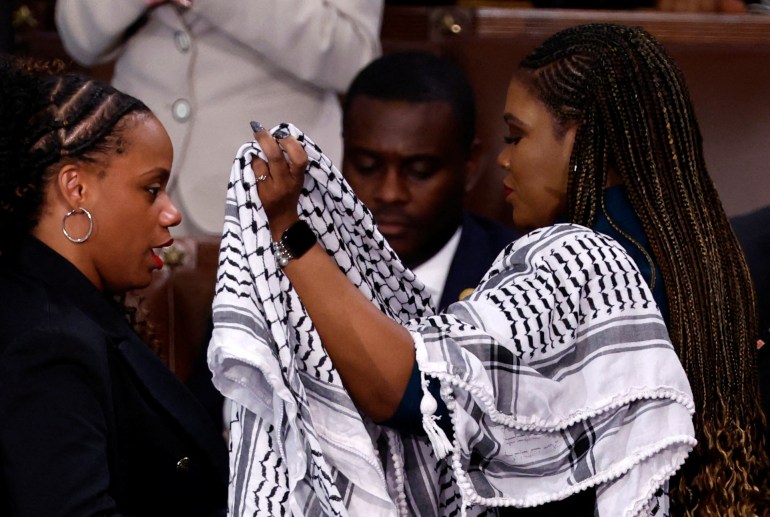And yet, on October 16, less than two weeks into Israel’s war in Gaza, United States Representative Summer Lee joined other progressive Democrats in calling for an immediate ceasefire in the Palestinian enclave.
That caught Tanisha Long’s attention. A 34-year-old community activist from Lee’s district in western Pennsylvania, Long remembers admiring the representative’s willingness to take a stand.
After all, the bombs raining down on Gaza risked sparking a humanitarian crisis. But few in Congress were criticising the military campaign at the time.
“A lot of people weren’t even willing to touch the issue,” Long said.
But Lee’s critical view of Israel’s war in Gaza has made her a target in the upcoming US election season. On Tuesday, Lee faces a competitive primary in her district, as a fellow Democrat seeks to unseat her for being too “extreme”.
Observers say the race will be a referendum on whether progressives can challenge Washington’s longstanding support of Israel — and whether Lee herself can persist in an area long dominated by establishment politics.
But Long, the activist, is optimistic. She sees Lee’s call for a ceasefire as a bold move for a freshman Congress member — and a sign that the representative will not easily be swayed by reelection pressures.
“She gained a lot of my respect, and she will continue to have my respect because she refuses to pretend that it’s something that it is not,” Long said of the war, citing its ever-growing death toll.
“She didn’t behave like somebody who had a primary coming up.”
A meteoric rise
Lee, a 36-year-old lawyer, has had a meteoric rise in US politics. Born and raised in western Pennsylvania, she got her start as a community organiser, entering politics in an effort to reform the public school system.
In 2019, she successfully ran for the Pennsylvania State House of Representatives and founded a group to help other progressives attain public office.
When the incumbent Democrat for Pennsylvania’s 18th congressional district announced his retirement, Lee campaigned to succeed him, winning his seat in 2022. Her victory made her the first Black woman to represent her state in the US House of Representatives.
But Lee’s stance on the war in Gaza has become a career-defining position.
The war began on October 7, when the Palestinian group Hamas launched an attack on southern Israel that killed at least 1,139 people. But Israel’s response in Gaza has killed over 34,000 Palestinians, with many more displaced and facing famine. Some United Nations experts have even warned of a risk of genocide.
The conflict has therefore been a divisive issue, splintering the Democratic Party. An increasing number of Democrats have come to question the $3.8bn in military aid the US provides to Israel every year.
Prominent progressives like Lee have also blasted US President Joe Biden for offering “unwavering” support to Israel, despite myriad allegations of rights abuses in Gaza.
Support for Israel has long been considered sacrosanct. And her opponent in the upcoming Democratic primary, Bhavini Patel, has zeroed in on Lee’s criticisms of Israel as an area of vulnerability.
Test of ‘staying power’
Both candidates have exchanged barbs over the issue in the lead-up to Tuesday’s face-off.
Patel has said Lee’s rhetoric on Israel underscores that she is too far left and out of step with the electorate of western Pennsylvania.
Lee, meanwhile, has accused Patel of relying on outside forces to buoy her campaign and of treating Israel as if it were beyond reproach.
Christopher Borick, a political science professor at Muhlenberg College in Allentown, Pennsylvania, said the race has highlighted and heightened fault lines within the Democratic Party.
The primary’s result could indicate which direction the party leans towards in the future, Borick explained.
Pennsylvania’s 18th congressional district has, for years, been solidly Democratic. It includes the former industrial city of Pittsburgh, as well as its surrounding suburbs.
But before Lee’s victory in the 2022 House race, the district had skewed towards more centrist candidates.
“This is a district where it’s not a given for progressive to win, compared to other districts that have produced some of the most progressive members of Congress,” Borick said.
The 2018 election, for instance, saw a wave of progressive candidates like Alexandria Ocasio Cortez and Ayanna Pressley win in ultra-liberal urban enclaves like New York City and Boston, Massachusetts.
Other progressives, like Ilhan Omar and Rashida Tlaib, made historic wins in Minnesota and Michigan.
But Lee is among a newer class of progressives representing Democratic areas that traditionally leaned more towards the centre, Borick explained.
That class also includes Congress members like Cori Bush from Missouri and Jamaal Bowman from New York, both of whom are facing primary challenges from more centrist candidates.
“The primary will show the staying power of a candidate like Lee,” Borick said, “and might give some optimism for progressives to expand their reach.”
Criticism of Israel looms large
Like Lee, the centrist candidate Patel has portrayed herself as part of a new generation of young politicians looking to represent a diverse stretch of western Pennsylvania.
A member of the Edgewood Borough Council and the co-founder of a tech startup, Patel was raised by a single mother who ran a food truck after immigrating to the US from India. Her campaign says that her upbringing instilled the “hard work and grit” that has informed Patel’s professional life ever since.
As is the case with most primary races, she and Lee have more policy overlaps than differences. That has made their divergent views on Israel’s war in Gaza more pronounced.
Patel has seized on criticism that Lee’s rhetoric has been reckless. After the war broke out on October 7, 40 rabbis and cantors in the Pittsburgh area released a letter criticising Lee’s response.
In March, they released a second letter accusing Lee of “divisive rhetoric” that they “perceived as openly anti-Semitic”.
Patel has echoed that condemnation, highlighting the risk of anti-Semitism in the shadow of the war.
She pointed to anti-Semitic attacks like the 2018 shooting at the Tree of Life synagogue, which took place in the Pittsburgh neighbourhood of Squirrel Hill, killing 11.
And at an event in January, Patel said Lee’s approach amounted to “stoking hatred”.
“There are local implications,” Patel said at the time, according to an account by Pittsburgh’s public radio. “This is the community that went through the worst anti-Semitic attack on American soil.”
But Lee has stood her ground, arguing that criticism of Israel is not the same as anti-Semitism.
“We have to be clear that no government, no country is above critique,” Lee said. “The way that [Israeli Prime Minister] Benjamin Netanyahu has conducted this war, it’s indefensible.”

A ‘flashpoint’ in the district
Patel has also slammed Lee’s support for the “uncommitted” movement, which has seen voters in several key swing states cast protest ballots during the primary season.
By refusing to vote for Biden in the Democratic primaries, they hope to send a signal that they will not tolerate the Democratic president’s approach to the war.
The issue has been a “flashpoint in the campaign and within the district itself”, said Borick, the political scientist.
“I think some among the more moderate voters, including a significant portion of Jewish voters in sections of the Pittsburgh area, were dissatisfied with Summer Lee before — but certainly [that] has been magnified post-October,” he said.
“At the same time, among progressive voters, younger voters, more left-leaning voters and voters of colour, support for Summer Lee has only intensified.”
As the primary approaches, for instance, Lee has nabbed endorsements from a range of moderate and progressive groups, as well as elected officials.
For instance, J Street, a moderate-leaning pro-Israel lobbying group, has endorsed Lee. Groups like Justice Democrats, Emgage and the Working Families Party have also offered Lee their support.
Patel, meanwhile, gained the endorsement of the 14th Ward Independent Democratic Club, which encompasses the community of Squirrel Hill. She also nabbed nods from several Hindu American organisations and labour groups.
In addition, the Moderate PAC, whose top funder is prominent Republican donor Jeffrey Yass, spent hundreds of thousands of dollars on advertisements for Patel, though she has denied any coordination with the group.
She maintains that her campaign has not worked with any pro-Israel lobbyists either.
Shifting politics
But as Tuesday’s race nears, Patel’s line of attack appears to have failed to catch fire. Mike Mikus, a Pittsburgh-based Democratic strategist, credited her lack of traction to shifting opinions in the US, particularly among Democrats.
For instance, the number of Congress members calling for a complete ceasefire has risen from 11 to 82, according to a tracker maintained by several antiwar groups.
The US public has also become increasingly wary of Israel’s approach to the war. In January, a poll from The Associated Press and the NORC Center for Public Affairs Research found that 50 percent of US adults believed Israel had gone too far in Gaza, up from 40 percent three months earlier.
A Gallup poll in March likewise found 55 percent of US residents disapproved of Israel’s actions.
Mikus said that, while there have been virtually no quality polls for the Pennsylvania primary race, there have been several indicators that Lee is in a “comfortable position”.
Most conspicuous, he explained, is the lack of involvement from the American Israel Public Affairs Committee (AIPAC), a pro-Israel lobbying group.
For months, AIPAC has reportedly been building a war chest to challenge progressive critics of Israel who are considered vulnerable in their primaries. The group is expected to spend heavily against Bush and Bowman, who were also among the first members of Congress to call for a ceasefire.
“If this race were closer, AIPAC would be on television — that’s my take as someone who has worked on campaigns for 30 years,” said Mikus.
AIPAC and its affiliated super PAC spent nearly $4m trying to defeat Lee during her 2022 race for Congress.
Just days before that election, AIPAC described Lee as part of the “anti-Israel fringe”. The organisation has repeatedly condemned Lee’s position since the war began.
“But they’re not here,” Mikus said. “So that tells me there’s not a poll showing that this is a winnable race.”
Even if Lee rides to an easy victory, community activists like Long still wonder what the long-term vision for the Democratic Party will be. Will the war in Gaza transform the party’s base in the months and years to come? Or will it fracture the party?
“If we want to continue to win elections, we’re going to have to work together,” Long said. “But there’s some positions and some policies and beliefs that aren’t negotiable.”
“So I wonder if we will just have to register a lot of newer voters and start reaching out to the younger generations a lot earlier. Because I do think some of these voters might be lost forever.”
